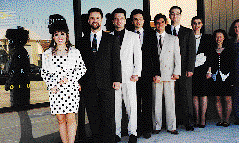|
GOLDSEA |
ASIAMS.NET |
ASIAN AMERICAN WONDER WOMEN
GUIDING SPIRIT
PAGE 2 OF 3
Young-Mi lifts her arm, clenches her fist and slams it against the plank, cracking it in two. The gym
erupts.
This is what Kim loves about teaching Jung SuWon.
It combines martial arts and philosophy to reach self-liberation. It
operates by tapping the life-force (Qi) that is believed to be as real
as the circulatory system and to flow along known pathways in the body.
Kim says someone like Young-Mi can realize her potential
by directing this energy. And Kim teaches how at the Jung SuWon Academy,
which she founded in the mid-80s.
Kim says she devised her interpretation of Jung SuWon
to overcome the hardship in her own life.
She was the first born to a simple and traditional
Confucian couple in a rural Korean village. At first, her parents were
thrilled when their child was delivered at 1 a.m. on January 1 in 1945.
Males born on that date were believed to bring good fortune. They thought
the birth was blessed.
But realizing the child was female, they reinterpreted
the birth as a curse.
They blamed their increasing bad luck on their little
girl as the years passed. Kim's father became an alcoholic and abused
her when drunk.
Kim was five when the Korean War broke
out. Once as her village was being bombed, her parents abandoned her
among the collapsing huts and falling shrapnel. Another village girl
spotted Kim, disoriented and crying, and led her to a shelter.
Shortly after, Kim watched helplessly as a bomb blast killed the girl who had just saved her.
Kim says that while watching her friend die and the village burn, she experienced a moment of insight. She thanked God she was alive and vowed to cherish life.
Years later, as a teenager, Kim also vowed to spurn
the traditional role of wife and mother and announced her intentions
to learn taekwondo. But Kim could find no willing instructor, since
a 5,000 year tradition prohibited women from studying it.
One day Kim befriended a Buddhist monk passing through
the village. He was a taekwondo master and agreed to instruct Kim in
secret. During their decade-long relationship, the monk also taught
Kim the principles of Qi, Buddhism and self-discipline.
One day in the early 1970s, the monk declared he had nothing left to teach. He advised
Kim to immigrate to the U.S., arguing that Korea's deteriorating economy
and her abusive family were stifling her growth. It was her callous
parents, the monk pointed out, who had driven her younger brother to
suicide. And he didn't want to see her go the same way.
Kim settled
in Vermont, planning to open a taekwondo school. First, though, she
had to learn English. All she knew were the well-rehearsed lines: "Hi,
my name is Tae Yun Kim. Can I be your friend?" She also needed cash.
She had just enough for a rundown apartment and cheap food.
work cleaning bathrooms at a Howard Johnson's. While scrubbing the toilets
and sinks, she would visualize taekwondo moves, her future plans and
her dreams, as the monk had taught her to do.
PAGE 3
Page 1 |
2 |
3
|
|
|
|

<
|
“Kim watched helplessly as a bomb blast killed the girl who had just saved her.”
|
CONTACT US
|
ADVERTISING INFO
© 1996-2013 Asian Media Group Inc
No part of the contents of this site may be reproduced without prior written permission.
|







